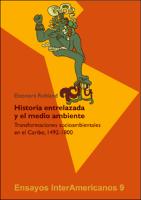¿Historia entrelazada y el medio ambiente?
Transformaciones socioambientales en el Caribe, 1492-1800
| dc.contributor.author | Rohland, Eleonora | |
| dc.contributor.editor | Raussert, Wilfried | |
| dc.contributor.editor | Kaltmeier, Olaf | |
| dc.date.accessioned | 2022-12-21T12:55:10Z | |
| dc.date.available | 2022-12-21T12:55:10Z | |
| dc.date.issued | 2020 | |
| dc.identifier.uri | https://library.oapen.org/handle/20.500.12657/60322 | |
| dc.language | Spanish | en_US |
| dc.relation.ispartofseries | Ensayos InterAmericanos | en_US |
| dc.subject.classification | thema EDItEUR::N History and Archaeology::NH History | en_US |
| dc.subject.classification | thema EDItEUR::N History and Archaeology::NH History::NHT History: specific events and topics::NHTQ Colonialism and imperialism | en_US |
| dc.subject.classification | thema EDItEUR::R Earth Sciences, Geography, Environment, Planning::RN The environment | en_US |
| dc.subject.other | Environmental history; postcolonial studies; climate; the Caribbean; entangled history | en_US |
| dc.title | ¿Historia entrelazada y el medio ambiente? | en_US |
| dc.title.alternative | Transformaciones socioambientales en el Caribe, 1492-1800 | en_US |
| dc.type | book | |
| oapen.abstract.otherlanguage | The objective of entangled history and the environment is to introduce climatic and other environmental factors into the postcolonial debate on the unequal power relations between the metropolis and its colonies. Dealing with both environment and empire, as well as unequal (colonial) power relations, has so far largely occurred in separate fields, environmental history, and postcolonial studies. The book attempts to bring the two strands together and to combine the conceptual perspective of intertwined history and comparative practices in order to highlight both material and constructed (or discursive) aspects of the environment as a factor in the formation of unequal (colonial) power relations. Two case studies are conducted through this conceptual lens. The first offers a new perspective on Christopher Columbus' first contact with the Arawak in Hispaniola in 1492. The second examines how climate became an argument for enslaving Africans and displacing them to sugar plantations in the Caribbean. | en_US |
| oapen.identifier.doi | 10.4119/unibi/2943285 | en_US |
| oapen.relation.isPublishedBy | b413a6b1-c758-49d1-bb94-e7433778a276 | en_US |
| oapen.relation.isbn | 9783946507574 | en_US |
| oapen.series.number | 9 | en_US |
| oapen.pages | 90 | en_US |
| oapen.place.publication | Bielefeld | en_US |

